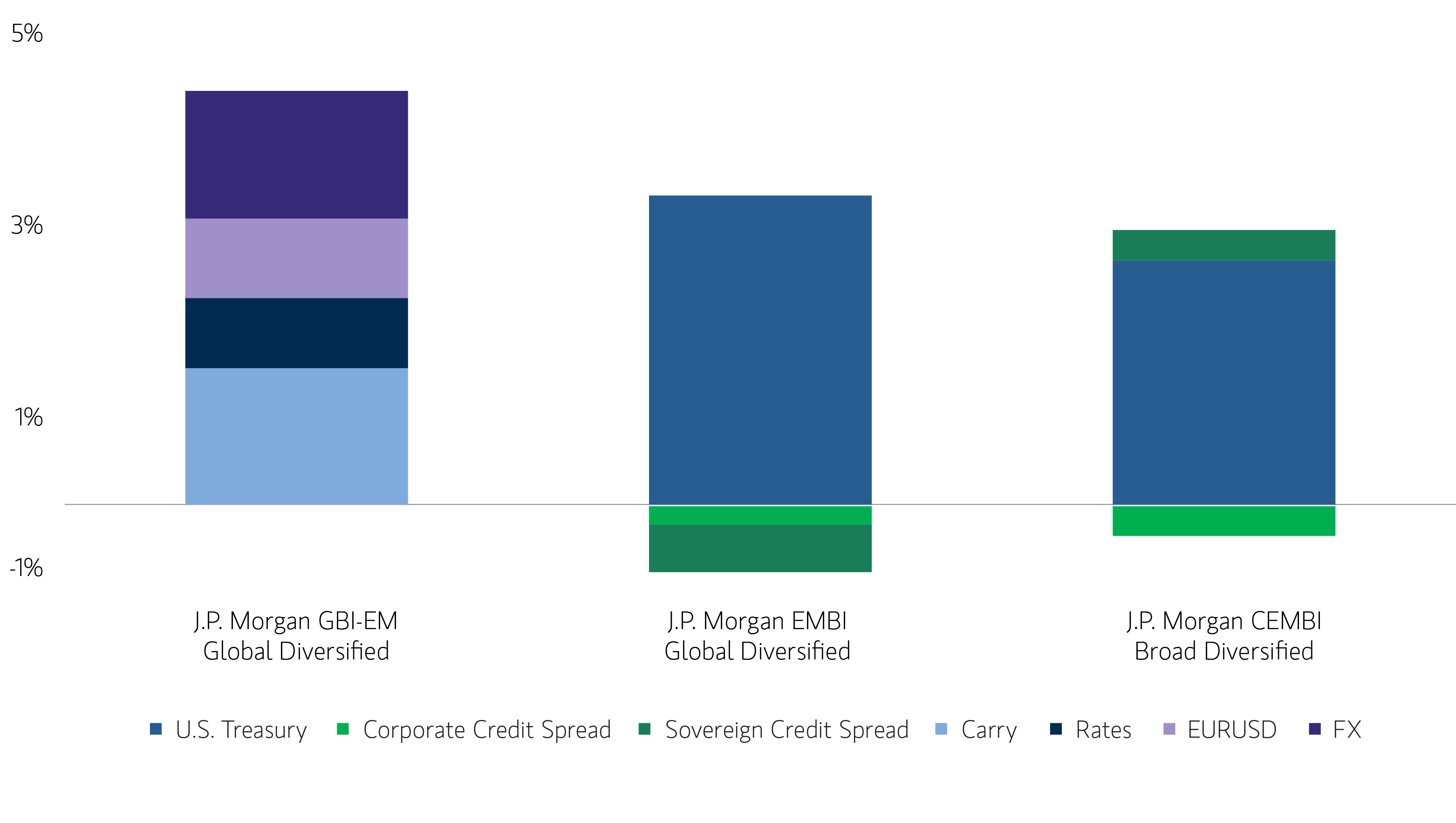Investors who search beyond the U.S., particularly within the broad and diverse universe of emerging markets, will likely encounter attractive investment opportunities.”
As investors wait for clarity in the wake of President Donald Trump’s sweeping tariff announcements, many are turning their attention beyond the U.S. after more than a decade of being overweight. For the past few years, the U.S. policy mix has increasingly been called into question in key areas including fiscal policy, monetary policy, property rights, the judicial system, and now trade policy. Despite these developments having spanned multiple years and administrations, the recognition of them by investors as measured by the broad underperformance of U.S. assets appears only quite recent (i.e. year-to-date). Against this backdrop, we are seeing more and more investors include emerging markets debt (EMD) and emerging markets equities (EME) more notably into their globally diversified portfolios.
EMD weathered the storm of global macroeconomic uncertainty and performed well during the first quarter of 2025, as currencies broadly strengthened, supported by a weakening U.S. dollar, and a global rally in interest rates.
Index Performance Recap

Source: J.P. Morgan, Morgan Stanley Investment Management calculations. Corporate Credit Spread and Sovereign Credit Spread return attributions are modeled by decomposing the overall spread return to its two components: the sovereign spread and the corporate spread over the sovereign. It is not possible to invest directly in an index. Data provided is for informational use only. Past performance is no guarantee of future results. See end of report for important additional information.
Index Performance Recap
DISPLAY 2

Source: J.P. Morgan, Morgan Stanley Investment Management calculations. Corporate Credit Spread and Sovereign Credit Spread return attributions are modeled by decomposing the overall spread return to its two components: the sovereign spread and the corporate spread over the sovereign. It is not possible to invest directly in an index. Data provided is for informational use only. Past performance is no guarantee of future results. See end of report for important additional information.
Of course, the first quarter seems like a distant memory in the wake of the market movements since April 2, yet emerging markets (EM) and broader non-U.S. assets have continued to outperform. The combination of the U.S. dollar continuing to weaken through April and global interest rates also declining has been a supportive macro environment for non-U.S. investments including emerging markets.
This outperformance of EM assets relative to the U.S. makes sense. In our view, U.S. policies have moved in a direction less supportive of investment over the past few years. Said another way, the level of economic freedom in the U.S. has been on a declining path. A few examples of a deteriorating policy mix have included the freezing of foreign assets held at the U.S. Fed displaying a decline in respect for property rights, worsening fiscal policy with the running of huge deficits for the past few years even while the economy has generally been running at full employment, and inflation being tolerated above target for an extended period of time representing a decrease in the soundness of money. The latest announcement of tariffs represents a deterioration in free-market trade policy. As experts in sovereign research with a focus on changes in economic policies and institutions across more than 130 countries, the market’s reaction to these U.S. policy developments is no surprise. Should any of the over 130 countries we follow were to announce these types of changes to their policy mix, we would expect a likely increase in the risk-premium associated with investing in that country including lower equity prices, wider credit spreads, and a weakening currency.
So what about emerging markets? From our perspective, it is always worth reminding casual observers that the group collectively referred to as “emerging markets” is really a heterogenous mix of 100+ countries – each with their own economy and direction. As an investment team that prides itself on doing deep, bottom-up analysis on individual countries and companies, this attribute is foundational to what we do every day. That said, there are a few higher-level points worth making as investors seek to determine whether notable increases to emerging markets allocations have merit today.
EM recently had a significant downturn. The period from 2020 through 2022 was a particularly challenging period for all, perhaps none more so than for the poorest countries in the world. The combination of the need for increased fiscal spending in battling COVID-19, the U.S. Federal Reserve’s historically aggressive tightening of monetary policy which increased the “hurdle rate” for investors to take risk elsewhere, and the Russian invasion of Ukraine and the related spike in many commodity prices presented massive challenges. Positioning remains light. Dedicated emerging markets funds have generally experienced notable net outflows since 2022 creating additional pressure on capital markets and leaving many investors under-allocated. Should recent outperformance draw investors back into the space – and we have reason to believe it is – an additional catalyst for performance would likely present. The number of positive, structural reform stories has increased. One result of the prior points, among others, was that many areas of emerging markets capital markets experienced notable stress including a number of sovereign bond defaults. A potential silver lining of this is that, when faced with these challenges, a number of countries have chosen to embark on positive, structural reform paths in order to improve economic outcomes for citizens and attract capital investment. For us as dedicated EM investors, reform stories are what get us really excited and present opportunity for investors.
Of course, not all emerging markets countries are engaged in positive reforms today and some are likely to be more susceptible to changes in U.S. policy than others. As always, a discerning eye is critical – particularly in light of today’s uncertain global macro backdrop.
Bottom Line: Several years of increased volatility and declines in U.S. economic policy has many investors considering reducing overweight exposure to the U.S. and re-sizing those outside the U.S. Given the relatively attractive valuations and the number of positive reform stories, emerging markets stand out for many as a compelling area to do so. The combination of increased diversification, higher yields and the potential to enhance portfolio returns appears compelling. Finally, we believe implementing with an active manager that can differentiate one policy mix from another across countries and companies and beyond benchmarks will likely achieve optimal outcomes for investors.
Emerging Markets Debt Team
Our over 40-year history of managing emerging markets debt has given us a unique perspective on managing risk for our clients. Our focus on utilizing the full investment universe, concentrating our research on countries and companies exhibiting structural changes, and our world-class dedicated trading and operations team differentiates us from other managers and drives our performance.
Featured Insights
RISK CONSIDERATIONS
There is no assurance that a Portfolio will achieve its investment objective. Portfolios are subject to market risk, which is the possibility that the market values of securities owned by the Portfolio will decline and may therefore be less than what you paid for them. Market values can change daily due to economic and other events (e.g. natural disasters, health crises, terrorism, conflicts and social unrest) that affect markets, countries, companies or governments. It is difficult to predict the timing, duration, and potential adverse effects (e.g. portfolio liquidity) of events. Accordingly, you can lose money investing. Fixed-income securities are subject to the ability of an issuer to make timely principal and interest payments (credit risk), changes in interest rates (interest-rate risk), the creditworthiness of the issuer and general market liquidity (market risk). In a rising interest-rate environment, bond prices may fall and may result in periods of volatility and increased portfolio redemptions. In a declining interest-rate environment, the portfolio may generate less income. Investments in foreign instruments or currencies can involve greater risk and volatility than U.S. investments because of adverse market, economic, political, regulatory, geopolitical, currency exchange rates or other conditions. In emerging or frontier countries, these risks may be more significant. Investors should be aware that this strategy may be subject to additional risks, which should be carefully considered prior to any investment decision.
Diversification does not eliminate risk of loss. Investments in foreign markets entail special risks such as currency, political, economic, and market risks. The risks associated with emerging markets are magnified when investing in frontier emerging market securities.
A separately managed account may not be appropriate for all investors. Separate accounts managed according to the particular strategy may include securities that may not necessarily track the performance of a particular index. Please consider the investment objectives, risks and fees of the Strategy carefully before investing. A minimum asset level is required. For important information about the investment managers, please refer to Form ADV Part 2.
The views and opinions and/or analysis expressed are those of the author or the investment team as of the date of preparation of this material and are subject to change at any time without notice due to market or economic conditions and may not necessarily come to pass. Furthermore, the views will not be updated or otherwise revised to reflect information that subsequently becomes available or circumstances existing, or changes occurring, after the date of publication. The views expressed do not reflect the opinions of all investment personnel at Morgan Stanley Investment Management (MSIM) and its subsidiaries and affiliates (collectively “the Firm”) and may not be reflected in all the strategies and products that the Firm offers.
Forecasts and/or estimates provided herein are subject to change and may not actually come to pass. Information regarding expected market returns and market outlooks is based on the research, analysis and opinions of the authors or the investment team. These conclusions are speculative in nature, may not come to pass and are not intended to predict the future performance of any specific strategy or product the Firm offers. Future results may differ significantly depending on factors such as changes in securities or financial markets or general economic conditions.
This material has been prepared on the basis of publicly available information, internally developed data and other third-party sources believed to be reliable. However, no assurances are provided regarding the reliability of such information and the Firm has not sought to independently verify information taken from public and third-party sources.
This material is a general communication, which is not impartial, and all information provided has been prepared solely for informational and educational purposes and does not constitute an offer or a recommendation to buy or sell any particular security or to adopt any specific investment strategy. The information herein has not been based on a consideration of any individual investor circumstances and is not investment advice, nor should it be construed in any way as tax, accounting, legal or regulatory advice. To that end, investors should seek independent legal and financial advice, including advice as to tax consequences, before making any investment decision.
Charts and graphs provided herein are for illustrative purposes only. Past performance is no guarantee of future results.
The indexes are unmanaged and do not include any expenses, fees, or sales charges. It is not possible to invest directly in an index. Any index referred to herein is the intellectual property (including registered trademarks) of the applicable licensor. Any product based on an index is in no way sponsored, endorsed, sold, or promoted by the applicable licensor and it shall not have any liability with respect thereto.
This material is not a product of Morgan Stanley’s Research Department and should not be regarded as a research material or a recommendation.
The Firm has not authorized financial intermediaries to use and to distribute this material unless such use and distribution is made in accordance with applicable law and regulation. Additionally, financial intermediaries are required to satisfy themselves that the information in this material is appropriate for any person to whom they provide this material in view of that person’s circumstances and purpose. The Firm shall not be liable for, and accepts no liability for, the use or misuse of this material by any such financial intermediary.
This material may be translated into other languages. Where such a translation is made this English version remains definitive. If there are any discrepancies between the English version and any version of this material in another language, the English version shall prevail.
The whole or any part of this material may not be directly or indirectly reproduced, copied, modified, used to create a derivative work, performed, displayed, published, posted, licensed, framed, distributed, or transmitted or any of its contents disclosed to third parties without the Firm’s express written consent. This material may not be linked to unless such hyperlink is for personal and non-commercial use. All information contained herein is proprietary and is protected under copyright and other applicable law.
Eaton Vance is part of Morgan Stanley Investment Management. Morgan Stanley Investment Management is the asset management division of Morgan Stanley.
DISTRIBUTION
This material is only intended for and will only be distributed to persons resident in jurisdictions where such distribution or availability would not be contrary to local laws or regulations.
MSIM, the asset management division of Morgan Stanley (NYSE: MS), and its affiliates have arrangements in place to market each other’s products and services. Each MSIM affiliate is regulated as appropriate in the jurisdiction it operates. MSIM’s affiliates are: Eaton Vance Management (International) Limited, Eaton Vance Advisers International Ltd, Calvert Research and Management, Eaton Vance Management, Parametric Portfolio Associates LLC, and Atlanta Capital Management LLC.
This material has been issued by any one or more of the following entities:
EMEA:
This material is for Professional Clients/Accredited Investors only.
In the EU, MSIM and Eaton Vance materials are issued by MSIM Fund Management (Ireland) Limited (“FMIL”). FMIL is regulated by the Central Bank of Ireland and is incorporated in Ireland as a private company limited by shares with company registration number 616661 and has its registered address at 24-26 City Quay, Dublin 2, D02 NY 19, Ireland.
Outside the EU, MSIM materials are issued by Morgan Stanley Investment Management Limited (MSIM Ltd) is authorised and regulated by the Financial Conduct Authority. Registered in England. Registered No. 1981121. Registered Office: 25 Cabot Square, Canary Wharf, London E14 4QA.
In Switzerland, MSIM materials are issued by Morgan Stanley & Co. International plc, London (Zurich Branch) Authorised and regulated by the Eidgenössische Finanzmarktaufsicht ("FINMA"). Registered Office: Beethovenstrasse 33, 8002 Zurich, Switzerland.
Outside the US and EU, Eaton Vance materials are issued by Eaton Vance Management (International) Limited (“EVMI”) 125 Old Broad Street, London, EC2N 1AR, UK, which is authorised and regulated in the United Kingdom by the Financial Conduct Authority.
Italy: MSIM FMIL (Milan Branch), (Sede Secondaria di Milano) Palazzo Serbelloni Corso Venezia, 16 20121 Milano, Italy. The Netherlands: MSIM FMIL (Amsterdam Branch), Rembrandt Tower, 11th Floor Amstelplein 1 1096HA, Netherlands. France: MSIM FMIL (Paris Branch), 61 rue de Monceau 75008 Paris, France. Spain: MSIM FMIL (Madrid Branch), Calle Serrano 55, 28006, Madrid, Spain. Germany: Germany: MSIM FMIL (Frankfurt Branch), Grosse Gallusstrasse 18, 60312 Frankfurt am Main, Germany (Gattung: Zweigniederlassung (FDI) gem. § 53b KWG). Denmark: MSIM FMIL (Copenhagen Branch), Gorrissen Federspiel, Axel Towers, Axeltorv2, 1609 Copenhagen V, Denmark.
MIDDLE EAST
Dubai: MSIM Ltd (Representative Office, Unit Precinct 3-7th Floor-Unit 701 and 702, Level 7, Gate Precinct Building 3, Dubai International Financial Centre, Dubai, 506501, United Arab Emirates. Telephone: +97 (0)14 709 7158). This document is distributed in the Dubai International Financial Centre by Morgan Stanley Investment Management Limited (Representative Office), an entity regulated by the Dubai Financial Services Authority (“DFSA”). It is intended for use by professional clients and market counterparties only. This document is not intended for distribution to retail clients, and retail clients should not act upon the information contained in this document.
This document relates to a financial product which is not subject to any form of regulation or approval by the DFSA. The DFSA has no responsibility for reviewing or verifying any documents in connection with this financial product. Accordingly, the DFSA has not approved this document or any other associated documents nor taken any steps to verify the information set out in this document and has no responsibility for it. The financial product to which this document relates may be illiquid and/or subject to restrictions on its resale or transfer. Prospective purchasers should conduct their own due diligence on the financial product. If you do not understand the contents of this document, you should consult an authorized financial adviser.
US
NOT FDIC INSURED | OFFER NO BANK GUARANTEE | MAY LOSE VALUE | NOT INSURED BY ANY FEDERAL GOVERNMENT AGENCY | NOT A DEPOSIT
Latin America (Brazil, Chile Colombia, Mexico, Peru, and Uruguay)
This material is for use with an institutional investor or a qualified investor only. All information contained herein is confidential and is for the exclusive use and review of the intended addressee and may not be passed on to any third party. This material is provided for informational purposes only and does not constitute a public offering, solicitation, or recommendation to buy or sell for any product, service, security and/or strategy. A decision to invest should only be made after reading the strategy documentation and conducting in-depth and independent due diligence.
ASIA PACIFIC
Hong Kong: This material is disseminated by Morgan Stanley Asia Limited for use in Hong Kong and shall only be made available to “professional investors” as defined under the Securities and Futures Ordinance of Hong Kong (Cap 571). The contents of this material have not been reviewed nor approved by any regulatory authority including the Securities and Futures Commission in Hong Kong. Accordingly, save where an exemption is available under the relevant law, this material shall not be issued, circulated, distributed, directed at, or made available to, the public in Hong Kong. Singapore: This material is disseminated by Morgan Stanley Investment Management Company and may not be circulated or distributed, whether directly or indirectly, to persons in Singapore other than to (i) an accredited investor (ii) an expert investor or (iii) an institutional investor as defined in Section 4A of the Securities and Futures Act, Chapter 289 of Singapore (“SFA”); or (iv) otherwise pursuant to, and in accordance with the conditions of, any other applicable provision of the SFA. This publication has not been reviewed by the Monetary Authority of Singapore. Australia: This material is provided by Morgan Stanley Investment Management (Australia) Pty Ltd ABN 22122040037, AFSL No. 314182 and its affiliates and does not constitute an offer of interests. Morgan Stanley Investment Management (Australia) Pty Limited arranges for MSIM affiliates to provide financial services to Australian wholesale clients. Interests will only be offered in circumstances under which no disclosure is required under the Corporations Act 2001 (Cth) (the “Corporations Act”). Any offer of interests will not purport to be an offer of interests in circumstances under which disclosure is required under the Corporations Act and will only be made to persons who qualify as a “wholesale client” (as defined in the Corporations Act). This material will not be lodged with the Australian Securities and Investments Commission.
Japan:
For professional investors, this document is circulated or distributed for informational purposes only. For those who are not professional investors, this document is provided in relation to Morgan Stanley Investment Management (Japan) Co., Ltd. (“MSIMJ”)’s business with respect to discretionary investment management agreements (“IMA”) and investment advisory agreements (“IAA”). This is not for the purpose of a recommendation or solicitation of transactions or offers any particular financial instruments. Under an IMA, with respect to management of assets of a client, the client prescribes basic management policies in advance and commissions MSIMJ to make all investment decisions based on an analysis of the value, etc. of the securities, and MSIMJ accepts such commission. The client shall delegate to MSIMJ the authorities necessary for making investment. MSIMJ exercises the delegated authorities based on investment decisions of MSIMJ, and the client shall not make individual instructions. All investment profits and losses belong to the clients; principal is not guaranteed. Please consider the investment objectives and nature of risks before investing. As an investment advisory fee for an IAA or an IMA, the amount of assets subject to the contract multiplied by a certain rate (the upper limit is 2.20% per annum (including tax)) shall be incurred in proportion to the contract period. For some strategies, a contingency fee may be incurred in addition to the fee mentioned above. Indirect charges also may be incurred, such as brokerage commissions for incorporated securities. Since these charges and expenses are different depending on a contract and other factors, MSIMJ cannot present the rates, upper limits, etc. in advance. All clients should read the Documents Provided Prior to the Conclusion of a Contract carefully before executing an agreement. This document is disseminated in Japan by MSIMJ, Registered No. 410 (Director of Kanto Local Finance Bureau (Financial Instruments Firms)), Membership: The Japan Securities Dealers Association, the Investment Trusts Association, Japan, the Japan Investment Advisers Association, and the Type II Financial Instruments Firms Association.










